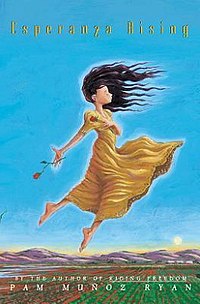Title: Esperanza Rising
Author: Pam Munoz Ryan
Required Text
Reading Esperanza
Rising was like reading a fairytale gone wrong to me. The story begins by
detailing the luxurious life of a young girl, Esperanza, who lives on a ranch
in Mexico with her wealthy family. Esperanza’s life consists of servants who
wait on her hand and foot, fancy dresses and parties, and all of the toys a
young girl could ever dream of. However, after a series of unexpected tragedies,
all of this is gone. Suddenly, Esperanza and her family must make a drastic
change in their life and move to the United States to find work. While in
America, Esperanza and her family become farm workers and must live in a
Mexican camp with the rest of their race. Not only is this a culture shock for
Esperanza, but she isn’t ready for the enormous hardships she now faces. With
tragedy waiting around every corner, will Esperanza be able to keep her family
together? I enjoyed the uncertainty and suspense this book offered the reader.
I personally liked this book very much particularly
because of the changes the main character, Esperanza, goes through. The reader
experiences Esperanza mature very quickly in only a matter of months. To me, it
serves as a reminder of what tragedies can do to us and how they can put things
in perspective and change us for the better despite the sorrow they bring. I
also enjoyed this book because it gave me insight to a portion of what was
going on during The Great Depression that I knew little to none about. Reading
about Esperanza’s family and the hardships they and other Mexican-Americans
endured during this time was truly heartbreaking for me to read on top of the
personal dilemmas they face. I would use this book particularly with middle
school students because it gives some good insight to what was going on during
The Great Depression. It would definitely help illuminate some of the concepts
learned in social studies and give the students a better understanding of
Mexican-American culture at this time in history.

No comments:
Post a Comment